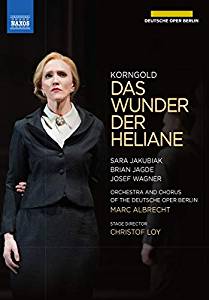KORNGOLD Das Wunder der Heliane (Albrecht)
View record and artist detailsRecord and Artist Details
Composer or Director: Erich Wolfgang Korngold
Genre:
Opera
Label: Naxos
Magazine Review Date: AW2019
Media Format: CD or Download
Media Runtime: 167
Mastering:
DDD
Catalogue Number: 2 110584

Tracks:
| Composition | Artist Credit |
|---|---|
| (Das) Wunder der Heliane |
Erich Wolfgang Korngold, Composer
Berlin Deutsche Oper Chorus Berlin Deutsche Oper Orchestra Brian Jagde, Stranger, Tenor Burkhard Ulrich, Blind Judge, Tenor Derek Welton, Gatekeeper, Bass-baritone Erich Wolfgang Korngold, Composer Josef Wagner, Ruler, Bass-baritone Marc Albrecht, Conductor Okka Von der Damerau, Messenger, Mezzo soprano Sara Jakubiak, Heliane, Soprano |
Author: Mike Ashman
It’s that Strauss opera – especially its scale and mythology – which was a definitive influence on Heliane. As in Frau, Korngold’s weightily scored musical depiction of simple stage actions (a push, a fall) makes Puccini’s illustrative scoring in, say, Tosca seem restrained. Yet subtle balancing in the pit and among the drama onstage can do a great deal, and conductor and stage director certainly achieve both in this recent Berlin production. Albrecht cheats us of none of the impact of Korngold’s scoring – and it is big – but paces the accompaniment to the drama tightly. And that’s none too easy because, as if in anticipation of his coming work for the movies, Korngold is far more illustrator than psychological commentator (you may argue it’s a backward step from Wagner, Strauss and Mahler). You may recognise Christof Loy’s and designers Johannes Leiacker and Barbara Drosihn’s work from their Covent Garden productions: a single-unit large-room set; a stripped-down look, partly modernised (to about 1930s/’40s); and many ‘extra’ actors but total fidelity to the score’s action rather than translation to another sphere or style. It works well here, emphasising the sinister aspects of the story with an eerie, Kafkaesque calm rather than invented period weirdness.
No praise is too high for the three lead singers, who you feel must have been living in an oxygen tent to encompass so fully the technical demands of projecting their parts over such a huge barrage of sound. They also act with impressive minimalist intensity and Jakubiak takes on fully the requirement that her character appears nude towards the end of Act 1, more moving (and dramatically correct) than a rival production on YouTube in which Heliane appears in vampish underwear. But their strength and fluency – and embracing of the style – in the music gives this set a clear advantage over its rivals. Okka von der Damerau also is refreshingly and un camply straightforward as the important Botin, the moralist Messenger once the Ruler’s lover. The John Mauceri recording (Decca, 4/93) was an important pioneer but lacks Albrecht’s live theatrical unity, while the cast from Freiburg (Naxos, 1/19) do not equal their colleagues here. Hugely recommended: an in-at-the-deepest-end introduction to Korngold’s art.
Discover the world's largest classical music catalogue with Presto Music.

Gramophone Digital Club
- Digital Edition
- Digital Archive
- Reviews Database
- Full website access
From £8.75 / month
Subscribe
Gramophone Full Club
- Print Edition
- Digital Edition
- Digital Archive
- Reviews Database
- Full website access
From £11.00 / month
Subscribe
If you are a library, university or other organisation that would be interested in an institutional subscription to Gramophone please click here for further information.




